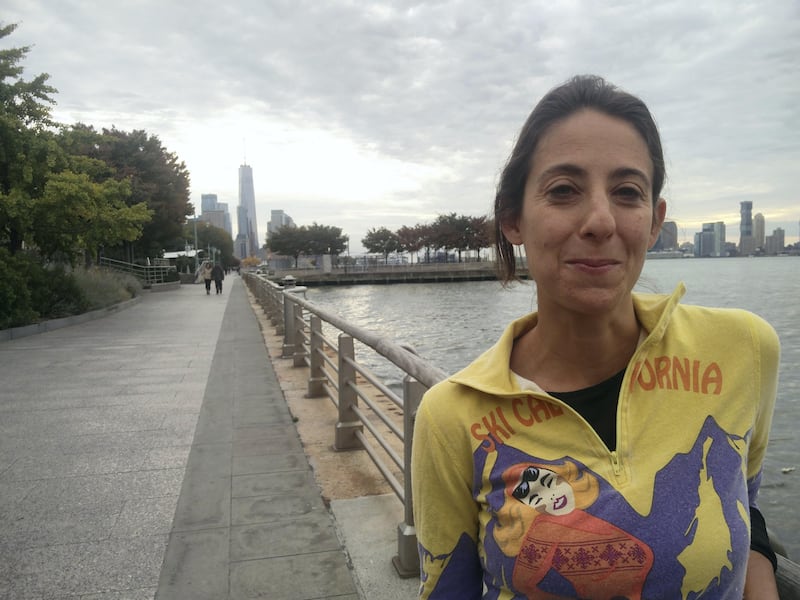A day after a man drove a pickup truck into a crowd of cyclists in Manhattan killing eight people, Elizabeth Oliner laced up her running shoes and headed out for one of her final training sessions before tackling the New York City Marathon.
“This is the run that I do every day,” she said, looking up and down the West Side Highway as if it were any other weekday afternoon.
From her home on West Street she turned north, up the bike path beside the Hudson River. This was close to the point where police say 29-year-old Sayfullo Saifov began his rampage by swinging his rental vehicle on to the cycle lane.
If she had gone for her run on Tuesday she might have been caught in the carnage instead of watching from her window as police cars raced to the scene. A day on and she was back to her route as much out of the convenience of routine as bravery.
“To be honest it would be pain to go anywhere else,” added Ms Oliner, a trademark lawyer.
It is not easy to faze New Yorkers.
That resilience — or unflappability — will be on display on Sunday. Police and city officials say they will deploy extra resources to protect the 50,000 runners and 2.5 million spectators expected to line the streets.
Organisers said the event was never in doubt. Instead New York Road Runners announced it would constantly review its plans to ensure the event went off safely.
“For this weekend’s marathon, as with all of our events, the safety and security of our runners, staff, volunteers, and spectators is our top priority,” it said in a statement.
No one needs reminding of what happened at the 2013 Boston Marathon. Three people died and hundreds were injured when a pressure-cooker bomb exploded near the finish line.
Since then the marathon has taken on intense meaning, as a symbol of both resistance to violent extremism and strength of a city to overcome pain. "Boston Strong" became its two-word expression.
New York has been there too.
Its first baseball game after 9/11 — when the New York Mets played the Atlanta Braves — is remembered as a first step in a long healing process. The home team paid tribute to emergency service sacrifices by wearing police and fire department caps. When fan favourite Mike Piazza hit the winning home run an emotional night took on an almost cathartic experience.
That year the New York Yankees also reached the World Series
____________________
Read more
[ New York attacker should get the death penalty, Trump says ]
[ From celebrating to mourning: Victims of deadly attack in New York ]
[ What made NYC attacker Sayfullo Saipov kill? ]
____________________
John Catsimatidis, a supermarket and real estate mogul whose talk radio show makes him a city institution, said it would take more than a terror attack to knock the city’s population off its stride.
“We bounce back and move on,” he said. “I don’t think anybody was scared to go to the World Series games, we had hundreds of thousands of people at football games.”
Lower Manhattan was almost back to normal a day after the attack. Residents went about their business picking their way past the phalanx of TV crews camped close to where the pickup was finally stopped.
“We are trying to make it normal by doing normal things,” said Tara Fitzpatrick. For her that meant catching up with a friend while their children played among the piles of autumn leaves in Washington Market Park.
For cyclists and runners that meant returning to the West Side Highway, scene of the attack.
Christie Offenbacher, a social worker, said it was her favourite place to cycle. Its views of the Hudson River made it one of the few routes in Manhattan with a feeling of openness.
If people in Paris responded to the 2015 attacks on nightclubs and cafes by celebrating their right to a glass of wine and live music, then she would do the same for the pleasure of cycling in the autumn air.
“We can’t live in fear,” was how she put it.
Joggers and dog walkers pottered up and down the route. In between came the more serious runners wearing studied concentration as they prepared for Sunday.
Yun, a financial worker in a fluorescent jacket who gave only his first name, said he never entertained any thought of dropping out. The city police were the best in the world, he explained.
He said he expected intense feelings even if it would not quite compare to Boston, where the marathon itself had been targeted.
“There’ll be more emotion but it won’t be Boston Strong,” he said.
His words have a second meaning: New York is not Boston.
Manhattan is a centre of the world’s financial markets and knowledge industries. Hollywood actors, rock stars and sporting heroes attract barely a sideways glance as they go about their business.
The city has a momentum of its own, a power that drives it forward no matter what. It is like a prize fighter that never stays down, said Hank Sheinkopf, renowned as a master image maker in New York’s murky political world.
“Let me put it this way, New Yorkers should have coined the phrase what doesn’t kill you makes you stronger,” he said.
“They don’t give up, they don’t give in.”






